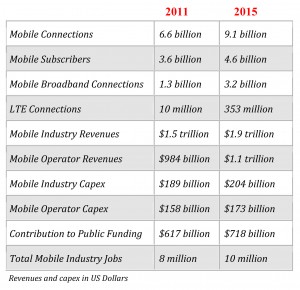Lately mobile sector of Pakistan is going through some uncertainties causing fear among the subscribers as if in near future time “the mobile handsets will be better to take photographs and hear radio”. Probably, these fears generated among the mobile subscribers are quite valid as during last 2 months few incidents have propagated such debates among the community.
According to GSMA (GSM Association), the mobile communications industry is creating a “Connected Economy” across the globe, through network investment, job creation and contributions to public funding. Beyond the global economic impact, mobile is a significant factor in the growth of local economies. According to the World Bank, a 10 per cent increase in mobile penetration drives a 0.6 per cent increase in a developed country’s GDP and a 0.81 per cent increase a developing country’s GDP. In low-to-middle income countries, a 10 per cent increase in Mobile Broadband penetration yields a 1.4 per cent increase in GDP.
Over the next four years, 2012 through 2015, the mobile industry will invest US$793 (billion) in capital and contribute US$2.7 trillion to public funding across the globe. The following table highlights the estimated global mobile economy by GSMA:
During the month of July, an interesting development took place when NAB (National Accountability Bureau summoned the FBR (Federal Board of Revenue) chief followed by representatives from five mobile operators over a tax evasion case. The details revealed that an audit exercise within FBR uncovered a PKR 47 billion uncollected sales tax on interconnection charges from the mobile operators since 2007 onwards.
Though, according to the tax collection figures of the FBR, mobile telecommunication is currently the largest tax collecting and paying sector of the country. The total contribution of the telecom sector to the national exchequer for 2011-12 was in excess of Rs 120 billion. This is in addition to the billions paid as other fees and levies to the federal and provincial governments and the authorities concerned. Foreign Direct Investment of $nine billion in the last ten years by the cellular industry and a total of approximately 1.4 million direct and indirect jobs created by the telecom industry.
During early August, FBR former Member Inland Revenue (IR) Shahid Hussain Asad categorically informed the National Assembly Standing Committee on Information Technology that the Mobile Phone Operators (MPOs) are not involved in any tax evasion of Rs 47 billion and the same legal stance has been communicated to the NAB.

It was like out of the frying pan into the fire for mobile operators when on a recent eve of ‘Eid-ul-Fitr’, Ministry of Interior through the telecom regulator directed suspension of mobile services in the cities of Karachi, Multan, Lahore and Quetta for good 10 hours or so. With an average ARPU of under USD 2, figures came up to be around PKR 2.6 Billion revenue lost to operators and 500 Million tax revenue lost to the Government.
The Federal Minister of Interior quoted terror threats during the Eid holidays as the reason behind the service shutdown. It may be noted that previously there had been few temporary suspension of mobile services in certain areas of the country especially in Quetta while security agencies carry out hunt operation; however, such kind of disconnection in major cities like Karachi and Lahore was recorded as first of its kind. Mobile subscribers in urban part of the country posted a strong and mirthful protest against the decision over social media platforms like Facebook and Twitter.
Following to the decision of service suspension, the Federal Interior Minister presented the idea of blocking prepaid connections as part of a security measure to pre-empt terrorist attacks. The proposal has also been supported by Chief Minister of Sindh province stating that in light of recent events, keeping an eye on mobile phone services has become necessary. He said that the proposed steps would not only help prevent the misuse of mobile SIMs but also help the government in collecting details of cell phone-users, which would help stem terrorism.
According to statistics, 80 per cent of all mobile phone SIMs being used in Pakistan are on prepaid accounts. This may be clarified here that the present deliberation over blocking of pre-paid SIMs addressed those connections which have been issued over fake documents (unauthenticated connections). There are approximately 2-3 million such active illegal SIMs though some sources quote the numbers to be as high as 7-8 million. Disconnecting such large number of users in span of seconds may result in serious nuisance to subscribers.
It may also be noted that sale of illegal SIMs is not a new issue on the board; it has been under prevention for last few years. A number of short code service including ‘789’ and ‘668’ have been introduced by the regulator to mobile subscribers in order to address the matter and regularize the illegal SIMs. PTA has also so far blocked some 4 million SIMs issued against fake documents. Probably, these efforts may have assisted subscribers but the root problem i.e. sale of illegal SIMs is yet to be handled properly. Just recalling the boom of mobile subscription upraise during 2005, 2006 and 2007 with millions of subscribers been added on monthly basis, no check or balance was observed at all over the SIMs sale mechanisms in the country. Mobile SIMs came to sale over dhabas, general stores, tobacco shops and you name it. Limiting the availability of mobile SIMs at mobile operators franchises might be a more workable or understandable solution than blocking a whole bunch of millions connections.
A sector touching revenues of PKR 365 Billion, contributing PKR 117 billion to national exchequer during FY 2011 and serving a subscriber base of over 112 million out of a 120 million population would surely observe a hesitancy with reference to its present and future. A moment while subscribers are anxiously waiting for introduction of 3G services in the country with equal eagerness among the Government as well to attract PKR billions as spectrum fee and further investment, such happenings is putting mobile sector of the country ‘In the Line of Security’. All cellular mobile operators (CMOs) in Pakistan are multinational companies (MNCs) operating under the direct control of their foreign parent companies/investors. Protecting their investments and interests is quite important towards further growth and prosperity of mobile services in Pakistan. Some clear roadmap with concrete results is required rather than haste in waste decisions that might increase the genuine fears among general public as if their mobile handsets would continue to show network signals.
May 8, 2025











